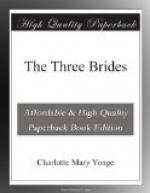“I do not think so,” returned Jenny. “His spirits would not be worn by doubt of you—the worst doubt of all: and he would feel that he had something to strive for.”
Eleonora walked on for some steps in silence, then exclaimed, “Yes, but there’s his family. It would only stir up trouble for them there. They can’t approve of me.”
“They don’t know you. When they do, they will. Now they only see what looks like—forgive me, Lena—caprice and coquetry; they will know you in earnest, if you will let them.”
“You don’t mean that they know anything about it!” exclaimed Eleonora.
Jenny almost laughed. “Not know where poor Frank’s heart is? You don’t guess how those sons live with their mother!”
“I suppose I have forgotten what sincerity and openness are,” said Eleonora, sadly. “But is not she very much vexed?”
“She was vexed to find it had gone so deep with him,” said Jenny; “but I know that you can earn her affection and trust by being staunch and true yourself—and it is worth having, Lena!”
For Jenny knew Eleonora of old, through Emily’s letters, and had no doubt of her rectitude, constancy, and deep principle, though she was at the present time petrified by constant antagonism to such untruthfulness as, where it cannot corrupt, almost always hardens those who come in contact with it. And this cruel idea of self-sacrifice was, no doubt, completing the indurating process.
Jenny knew the terrible responsibility of giving such advice. She had not done it lightly. She had been feeling for years past that “’Tis better to have loved and lost, than never to have loved at all;” and she knew that uncertainty of the right to love and trust would have been a pang beyond all she had suffered. To give poor Eleonora, situated as she now was, admission to the free wholesome atmosphere of the Charnock family, was to her kind heart irresistible; and it was pleasant to feel the poor girl clinging to her, as people do to those who have given the very counsel the heart craved for.
It was twilight when the walk was over, and the drawing-room was empty; but Anne came to invite them to Mrs. Poynsett’s tea, saying that Cecil had Lady Tyrrell in her own sitting-room. Perhaps Mrs. Poynsett had not realized who was Jenny’s companion, for she seemed startled at their entrance; and Jenny said, “You remember Lenore Vivian?”
“I must have seen you as a child,” said Mrs. Poynsett, courteously. “You are very like your sister.”
This, though usually a great compliment, disappointed Eleonora, as she answered, rather frigidly, “So people say.”
“Have you walked far?”
“To the Outwood Lodge.”
“To-day? Was it not very damp in the woods?”
“Oh no, delightful!”
“Lena and I are old friends,” said Jenny; “too glad to meet to heed the damp.”
Here Raymond entered, with the air of a man who had just locked up a heavy post-bag at the last possible moment; and he too was amazed, though he covered it by asking why the party was so small.




